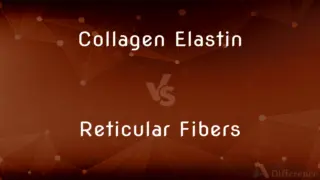Or vs. Xor — What's the Difference?
Edited by Tayyaba Rehman — By Maham Liaqat — Updated on April 8, 2024
"Or" is a logical operation that results in true if any of the operands are true, while "Xor" (exclusive or) requires exactly one operand to be true for the result to be true.

Difference Between Or and Xor
Table of Contents
ADVERTISEMENT
Key Differences
In the realm of logic and computing, "Or" and "Xor" are both binary operations used to compare two values, but they operate under different conditions. The "Or" operation, also known as inclusive or, returns a true result if at least one of the operands is true. This makes it inclusive, as it considers both conditions where either one or both operands are true. On the other hand, "Xor," short for exclusive or, is more restrictive, yielding a true result only if one, and exactly one, of the operands is true.
"Or" is commonly used in programming and decision-making scenarios where an action is required if any one of multiple conditions is met. For example, in an access control system, access might be granted if a user has either a pin code or a keycard. Conversely, "Xor" is used in situations where a distinction is essential, and the conditions must be mutually exclusive. A classic example of "Xor" application is in digital circuits, where it is used to implement binary addition and subtraction operations.
The truth tables for "Or" and "Xor" highlight their differences. For "Or," if both inputs are false, the output is false; otherwise, it is true. For "Xor," the output is true only if the inputs are different; if both are the same, the output is false. This characteristic of "Xor" makes it particularly useful in error detection and correction algorithms in digital communication, as it can identify when there has been a change in data.
In practical application, "Or" operations facilitate broader conditions and inclusivity, such as filtering data that meets any of several criteria. "Xor" operations, however, are pivotal in scenarios requiring exclusivity, such as toggling settings on and off or in cryptography, where it helps in creating reversible operations essential for encrypting and decrypting data.
Both "Or" and "Xor" play crucial roles in logic, computing, and electronic design, each suited to specific scenarios based on the requirements for inclusivity or exclusivity in the logical operations. The choice between "Or" and "Xor" depends on the desired outcome, whether any condition being true is sufficient or if only a single condition should be true while the other is false.
ADVERTISEMENT
Comparison Chart
Definition
True if any operands are true.
True only if exactly one operand is true.
Type
Inclusive
Exclusive
Truth Table
TT=T, TF=T, FT=T, FF=F
TT=F, TF=T, FT=T, FF=F
Use Case
Broad conditions, inclusivity.
Distinct, mutually exclusive conditions.
Practical Example
Access granted with pin or keycard.
Toggling a light switch on or off.
Compare with Definitions
Or
Common in everyday decision making.
You might go to the beach if it's sunny or if your friends go.
Xor
Enforces exclusivity in decision logic.
A quiz answer is correct if it's either choice A or B, but not both.
Or
Logical operation that is true if any condition is met.
A light turns on if it's dark outside or if the room is occupied.
Xor
Useful in binary operations.
In digital circuits, Xor gates are used for adding two binary numbers.
Or
Used for inclusivity in conditions.
You can enter the club if you are a member or if you have a pass.
Xor
Applied in cryptography for encryption.
Data encryption using Xor can be reversed only with the same key.
Or
Broadens the criteria for true outcomes.
An alarm sounds if there's a fire or unauthorized entry.
Xor
Logical operation true only when conditions are exclusively true.
An electronic lock opens with either a code or a fingerprint, but not both.
Or
Simplifies complex conditions.
A discount applies if the customer is a senior or a veteran.
Xor
Facilitates toggling effects.
Clicking a light switch uses Xor logic: the light changes state with each click.
Or
Used to indicate an alternative, usually only before the last term of a series
Hot or cold.
This, that, or the other.
Xor
A logical operator that returns a true value if one, but not both, of its operands is true. Also called exclusive OR.
Or
Used to indicate the second of two alternatives, the first being preceded by either or whether
Your answer is either ingenious or wrong. I didn't know whether to laugh or cry.
Xor
The logic function exclusive OR (as opposed to inclusive OR), whose output is true only when exactly one of its inputs is true.
Or
(Archaic) Used to indicate the first of two alternatives, with the force of either or whether.
Xor
(rare) Or (but not both).
Or
Used to indicate a synonymous or equivalent expression
Acrophobia, or fear of great heights.
Or
Used to indicate uncertainty or indefiniteness
Two or three.
Or
Before. Followed by ever or ere
"I doubt he will be dead or ere I come" (Shakespeare).
Or
A logical operator that returns a true value if one or both operands are true.
Or
Gold, represented in heraldic engraving by a white field sprinkled with small dots.
Or
Before.
Or
(logic) An operator denoting the disjunction of two propositions or truth values. There are two forms, the inclusive or and the exclusive or.
Or
Otherwise a consequence of the condition that the previous is false.
It's raining! Come inside or you'll catch a cold!
Or
(tincture) The gold or yellow tincture on a coat of arms.
Or
(tincture) Of gold or yellow tincture on a coat of arms.
Or
(obsolete) Early (on).
Or
(obsolete) Earlier, previously.
Or
Before; ere. Followed by "ever" or "ere".
Or
A particle that marks an alternative; as, you may read or may write, - that is, you may do one of the things at your pleasure, but not both. It corresponds to either. You may ride either to London or to Windsor. It often connects a series of words or propositions, presenting a choice of either; as, he may study law, or medicine, or divinity, or he may enter into trade.
If man's convenience, health,Or safety interfere, his rights and claimsAre paramount.
Maugre thine heed, thou must for indigenceOr steal, or beg, or borrow thy dispence.
Or
Ere; before; sooner than.
But natheless, while I have time and space,Or that I forther in this tale pace.
Or
Yellow or gold color, - represented in drawing or engraving by small dots.
Or
A state in northwestern United States on the Pacific
Or
A room in a hospital equipped for the performance of surgical operations;
Great care is taken to keep the operating rooms aseptic
Common Curiosities
How does "Xor" differ from "Or"?
"Xor" differs from "Or" by requiring that exactly one operand be true for the result to be true, embodying exclusivity.
Why is "Or" important in decision-making?
"Or" allows for flexibility in decision-making, broadening the criteria under which actions can be taken or decisions made.
Can "Or" and "Xor" be used interchangeably?
No, they serve different logical functions and are chosen based on the need for inclusivity or exclusivity in conditions.
Is "Or" used in everyday language?
Yes, "Or" is commonly used in everyday language and decisions, offering options where fulfilling any one condition is sufficient.
What does "Or" mean in logic?
In logic, "Or" is an operation that returns true if any of the compared conditions or operands are true.
How is "Xor" used in error detection?
"Xor" is used in error detection algorithms to compare data before and after transmission, identifying discrepancies.
Where is "Xor" commonly used?
"Xor" is commonly used in digital circuits, cryptography, and situations requiring mutually exclusive conditions.
How do "Or" and "Xor" operations impact programming?
They dictate the flow and outcomes of conditional statements, influencing how programs make decisions and process data.
Why might a programmer choose "Xor" over "Or"?
A programmer might choose "Xor" over "Or" for scenarios requiring a strict differentiation between conditions, ensuring only one can be true at a time.
What is a practical example of using "Xor"?
A practical example is toggling a setting on and off in a software application, where "Xor" ensures exclusivity in the toggle state.
Share Your Discovery

Previous Comparison
Blue vs. Indecent
Next Comparison
Lecturer vs. ReaderAuthor Spotlight
Written by
Maham LiaqatEdited by
Tayyaba RehmanTayyaba Rehman is a distinguished writer, currently serving as a primary contributor to askdifference.com. As a researcher in semantics and etymology, Tayyaba's passion for the complexity of languages and their distinctions has found a perfect home on the platform. Tayyaba delves into the intricacies of language, distinguishing between commonly confused words and phrases, thereby providing clarity for readers worldwide.














































